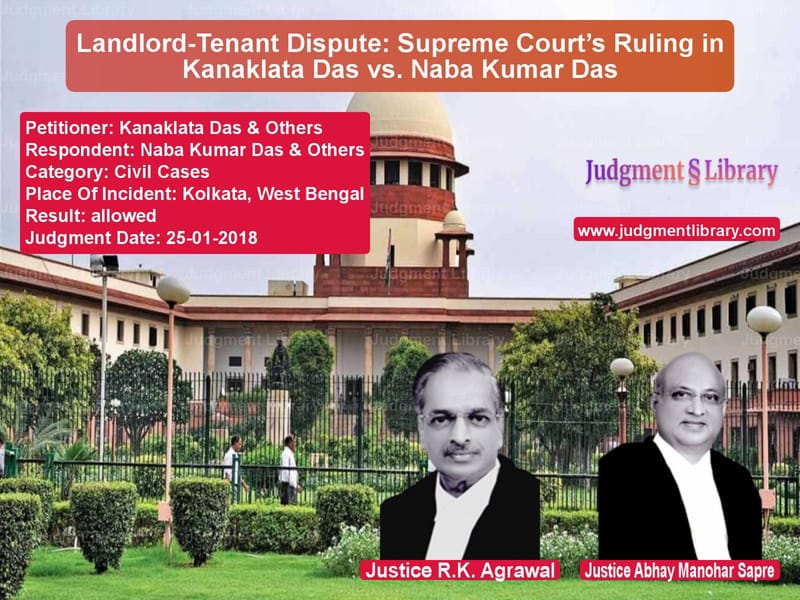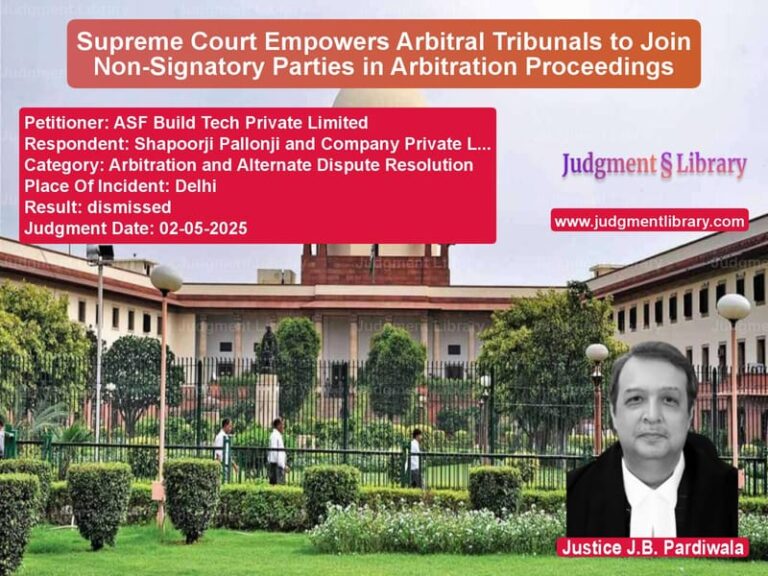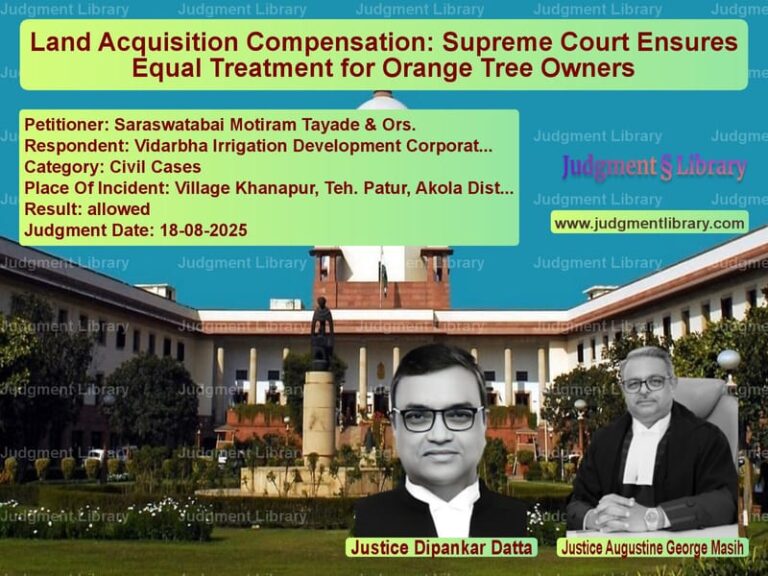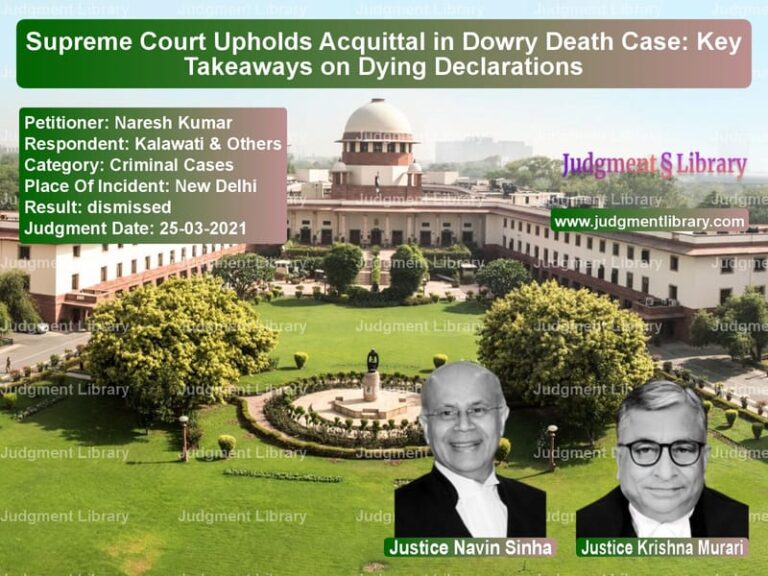Landlord-Tenant Dispute: Supreme Court’s Ruling in Kanaklata Das vs. Naba Kumar Das
The case of Kanaklata Das & Others vs. Naba Kumar Das & Others is a significant ruling concerning landlord-tenant disputes and the legal rights of third parties in an eviction suit. The Supreme Court examined whether a co-owner of a property could intervene as a co-plaintiff in an ongoing eviction suit initiated by another co-owner.
Background of the Case
The case arose from an ejectment suit (Ejectment Suit No. 1615/2000) filed by the appellants, Kanaklata Das and Others, against their tenants, respondent Nos. 2 to 5. The suit was filed in the Small Causes Court at Kolkata seeking eviction on the grounds of:
- Non-payment of rent.
- Subletting of the premises.
- Bona fide need for personal use.
During the proceedings, respondent No. 1, Naba Kumar Das, filed an application under Order 1 Rule 10(2) of the Code of Civil Procedure (CPC) to be impleaded as a co-plaintiff, claiming he was a co-owner of the property.
Legal Proceedings
Trial Court’s Decision
The Trial Court dismissed the application of respondent No. 1, ruling that he was not a necessary or proper party in the eviction suit.
High Court’s Decision
The High Court of Kolkata reversed the Trial Court’s decision, allowing respondent No. 1 to be impleaded as a co-plaintiff.
Supreme Court’s Consideration
The appellants challenged the High Court’s decision before the Supreme Court, arguing that the presence of respondent No. 1 was not necessary for adjudicating the eviction suit.
Key Legal Issues
- Whether a co-owner has the right to intervene in an eviction suit filed by another co-owner?
- Whether the presence of respondent No. 1 was necessary or proper for the resolution of the suit?
- Whether the High Court erred in allowing the impleadment of respondent No. 1?
Arguments by the Parties
Arguments by the Appellants (Kanaklata Das & Others)
- The landlord-tenant relationship was between them and respondent Nos. 2 to 5.
- Respondent No. 1 had no role in the lease agreement with the tenants.
- The eviction suit could be adjudicated without the involvement of respondent No. 1.
- The Trial Court correctly dismissed the application, but the High Court erred in reversing the order.
Arguments by the Respondent (Naba Kumar Das)
- He was a co-owner of the property and had a legal right to be part of the eviction proceedings.
- The eviction suit involved property rights, which also affected his interests.
- As a co-owner, he should have a say in how the property was handled.
Supreme Court’s Observations
On Necessary and Proper Parties
- “In an eviction suit, the landlord and tenant are the only necessary parties.”
- “A co-owner does not automatically become a necessary party unless their rights are directly affected.”
On Landlord-Tenant Relationship
- “The existence of a landlord-tenant relationship is sufficient to maintain an eviction suit.”
- “A third party’s claim to ownership does not alter the fundamental nature of an eviction suit.”
On the Role of a Co-Owner
- “A co-owner has the right to initiate an eviction suit independently.”
- “The law does not require all co-owners to be part of the proceedings.”
On the High Court’s Error
- “The High Court erred in treating respondent No. 1 as a necessary party.”
- “The ruling of the Trial Court was legally sound and should not have been interfered with.”
Supreme Court’s Final Judgment
The Supreme Court reversed the High Court’s decision and restored the order of the Trial Court. The key directives included:
- Respondent No. 1 was not a necessary party in the eviction suit.
- The application under Order 1 Rule 10(2) CPC was dismissed.
- The Trial Court was directed to proceed with the ejectment suit expeditiously.
- Respondent No. 1 was given liberty to file a separate suit if he wished to establish ownership rights.
Legal Significance of the Judgment
This ruling clarifies several key legal principles:
- Limited Scope of Eviction Suits: The focus of an eviction suit is on landlord-tenant relations, not ownership disputes.
- Right of Co-Owners: A co-owner does not have an automatic right to be impleaded unless their presence is essential.
- Judicial Restraint: The judgment reinforces that courts should not interfere in trial court rulings unless a significant legal error has occurred.
Conclusion
The Supreme Court’s decision in Kanaklata Das vs. Naba Kumar Das is a landmark ruling that reaffirms the limited scope of eviction suits. By ruling that a co-owner is not a necessary party in an eviction suit, the judgment protects the rights of landlords while ensuring that ownership disputes are addressed separately. This precedent will guide future cases involving similar landlord-tenant disputes.
Don’t miss out on the full details! Download the complete judgment in PDF format below and gain valuable insights instantly!
Download Judgment: Kanaklata Das & Othe vs Naba Kumar Das & Oth Supreme Court of India Judgment Dated 25-01-2018.pdf
Direct Downlaod Judgment: Direct downlaod this Judgment
See all petitions in Property Disputes
See all petitions in Landlord-Tenant Disputes
See all petitions in Judgment by R K Agrawal
See all petitions in Judgment by Abhay Manohar Sapre
See all petitions in allowed
See all petitions in supreme court of India judgments January 2018
See all petitions in 2018 judgments
See all posts in Civil Cases Category
See all allowed petitions in Civil Cases Category
See all Dismissed petitions in Civil Cases Category
See all partially allowed petitions in Civil Cases Category







